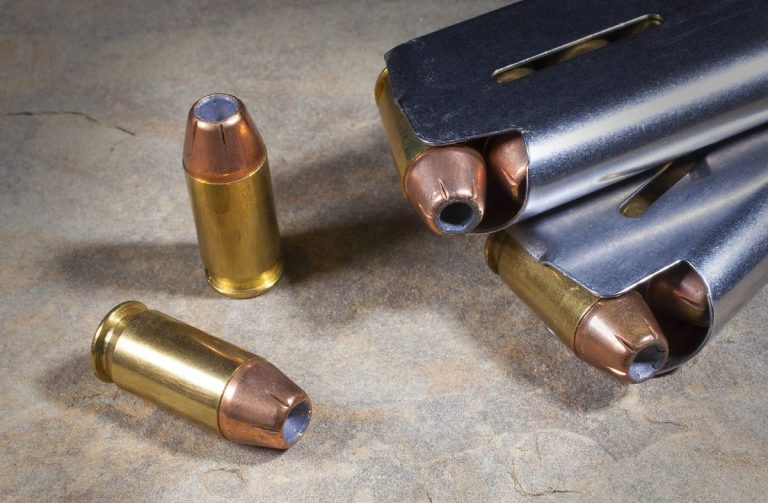In the realm of personal defense, the type of ammunition used can significantly impact the outcome of a defensive situation. A 9mm hollow point is often preferred among the various options for its adequate stopping power and safety considerations. This article explores the advantages of using hollow or expanding bullets for personal defense, detailing their design, functionality, and why they are considered superior in many self-defense scenarios. The focus is on understanding these bullets’ operational advantages and situational benefits, providing a comprehensive guide for anyone interested in optimizing their defensive capabilities through informed ammunition choices.
What Makes Hollow Bullets the Preferred Choice for Self-Defense?
Hollow bullets, often known as expanding bullets, expand upon impact, increasing their diameter. This expansion maximizes the bullet’s contact area with the target, creating a more significant wound channel and increasing the likelihood of quickly stopping a threat. The design of hollow bullets also helps prevent over-penetration, which is a critical safety concern in residential settings or crowded places. Expanding within the first target makes these bullets less likely to exit and cause unintended harm in the background. The energy transfer from a hollow bullet to the target is also more efficient, delivering the stopping power needed to neutralize threats swiftly and effectively. This efficiency ensures that each shot has a greater potential to incapacitate an assailant quickly, reducing the risk to the shooter and bystanders. Hollow bullets produce less recoil than their FMJ counterparts, improving shooter accuracy during rapid-fire scenarios. Moreover, the psychological deterrent of a more effective ammunition type should be considered in self-defense situations.
Comparing Hollow Bullets vs. Full Metal Jacket Bullets
While hollow and full metal jacket (FMJ) bullets are popular among shooters, they serve different purposes. FMJ bullets are typically used for practice and military applications due to their ability to effectively penetrate targets and lower cost. However, for personal defense, hollow bullets offer significant advantages. Unlike FMJ bullets, which are likely to pass through a target and potentially endanger bystanders, hollow bullets are designed to expand and stop within the target. This fundamental difference makes hollow bullets more suitable for defensive situations, where controlling the impact within an assailant to prevent collateral damage is crucial. FMJ bullets, while cheaper, also tend to have a higher risk of backfiring in urban environments, further complicating their use in personal defense. Additionally, the training with FMJ can differ significantly from the experience of using hollow points, potentially affecting performance during a critical incident. Lastly, law enforcement agencies have primarily transitioned to hollow points for these reasons, underscoring their effectiveness and reliability in field conditions.
Legal and Practical Considerations in Ammo Selection
When selecting ammunition like hollow bullets for personal defense, it is essential to consider legal and practical aspects. Legally, bullets like 9mm hollow point are regulated differently across various jurisdictions. Choosing the correct type of ammunition involves assessing the potential defensive scenarios one might face. For instance, the likelihood of over-penetration and the need for immediate stopping power should guide the decision process, emphasizing the suitability of hollow bullets for most home and personal defense situations.
The Impact of Ammunition Type on Firearm Performance
The type of ammunition used can significantly affect a firearm’s performance, particularly regarding recoil, accuracy, and reliability. Hollow bullets often have different recoil characteristics due to their design and materials. Some shooters might find that these bullets provide a more manageable recoil than FMJ bullets, enhancing control and accuracy during firing. Reliability is another consideration, as some firearms may be picky with the type of ammo they feed reliably. Testing different brands and types of hollow bullets is crucial to ensure the chosen ammunition performs well with the specific firearm used for defense.
Training and Preparedness with Defensive Ammunition
Training with ammunition intended for personal defense scenarios is crucial for preparedness. This practice ensures that shooters are familiar with the ammunition’s performance and handling characteristics, such as recoil and sound. Additionally, training helps assess the bullets’ accuracy and effectiveness at various distances and conditions, which can be critical in a real-world defense situation. Regular practice with the chosen defensive ammunition builds confidence and proficiency, which are essential to effective personal defense.
Choosing the correct ammunition for personal defense is a critical decision that can influence the effectiveness of a defensive response. Hollow or expanding bullets, like a 9mm hollow point, offer distinct advantages regarding stopping power, safety, and legal compliance. People can make informed choices that enhance their defensive capabilities by understanding the specific benefits and considerations associated with these bullets. Continual training and familiarity with the selected ammunition ensure that when the need arises, the response will be as effective and controlled as possible, maximizing personal safety and minimizing risks to others.

